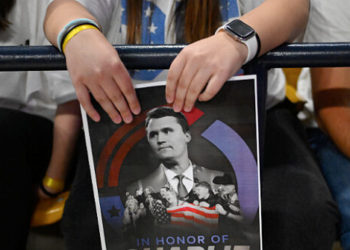“They will never give me a Nobel Peace Prize. It’s too bad. I deserve it, but they will never give it to me,” Donald Trump lamented mere weeks into his second presidential term. Since then, several members of Congress and foreign officials have echoed the proposition that his name be added to the next group of laureates. But what does the record show? Does Trump deserve to be honored with a place in history alongside Martin Luther King Jr. and Nelson Mandela?
Trump has repeatedly complained about not receiving credit for peace deals reached under his watch, citing the resolving of conflicts in Armenia-Azerbaijan, Congo-Rwanda, India-Pakistan, Serbia-Kosovo, and ongoing efforts in Ukraine and Gaza as top achievements. Disturbingly, some of these so-called deals include provisions that directly benefit the private sector, reducing U.S. diplomacy to a mercantilist collection of false wins that do little to advance peace. Meanwhile, deadly wars continue to ravage Ukraine and Gaza. “Everyone says I should get the Nobel Peace Prize for each one of these achievements,” he said at the United Nations General Assembly on Tuesday.
Before scrutinizing Trump’s peace deals, it’s worth taking into context his overall record since January on matters of war and peace, as the Nobel committee should if it reviews his nomination.
First, Trump is on pace to conduct more airstrikes eight months into his presidency than President Joe Biden did over the course of his entire four years in office. This historic spike suggests his first instinct is not to seek peace or deescalate tensions, but to resort to violence first and deal with consequences later.
In June, the president joined Israeli strikes against Iran that appear to have temporarily diminished Tehran’s nuclear capabilities but will likely result in ongoing conflict with Iran and its proxies. Far from making the United States safer, Trump’s attack has left us with an unappealing choice: Repeatedly strike Iranian facilities in the months and years to come, or risk waking up one day to a nuclear-armed Iran.
In September, the administration conducted three airstrikes against Venezuelan vessels it claimed without evidence were trafficking drugs to the United States. The strikes were conducted without any basis in law or due process—which would likely be a factor for the Nobel committee, though not in the way Trump hopes.
What’s more, the president recently designated the Department of Defense to be renamed the Department of War to amplify Secretary Pete Hegseth’s focus on “lethality” as a national defense strategy. It’s hard to imagine this messaging landing well with the Nobel committee. This move comes months after the administration set out to gut the United States Institute of Peace and shutter USAID, two congressionally mandated hubs of U.S. peace-building efforts, and slashed funding for United Nations peacekeeping operations. At the same time, Trump has threatened military action against Panama, Greenland, and Mexico.
Now, let’s examine the cases he cites in his Nobel campaign.
In the Nagorno-Karabakh region, decades of conflict erupted into war again in 2020, leaving thousands dead and up to 100,000 Armenians displaced. Trump touts the White House ceremony with Armenian and Azerbaijani leaders in August as a historic peace achievement, but the deal left core issues unresolved. It does not guarantee displaced Armenians a safe return, it leaves security provisions alarmingly vague, and it allows Baku to set shifting deadlines that delay true reconciliation, among other issues. Under the deal, a transport route called the “Trump Route for International Peace and Prosperity” would be developed and managed by U.S. firms.
The eastern region of the Democratic Republic of the Congo (DRC) has suffered repeated cycles of violence fueled by Rwanda-backed M23 rebels, resulting in mass displacement and atrocities. Trump’s June “peace deal” hasn’t stopped those atrocities: Massacres, sexual violence, and mass displacement have only intensified. Human rights monitors say Trump’s deal lacks enforcement and accountability mechanisms, shielding economic interests while civilians continue to suffer—M23 reportedly killed over 140 civilians in July alone. Far from ending aggression, the deal merely provides the U.S. with access to the DRC’s minerals.
India and Pakistan have fought multiple wars over the years and have engaged in frequent skirmishes over Kashmir, with cease-fires often proving to be fragile. Trump has repeatedly claimed he stopped conflict between the two, but New Delhi explicitly denies any U.S. mediation, insisting the cease-fire was achieved bilaterally via military hotlines. With one side publicly rejecting American involvement and the underlying Kashmir dispute still unresolved, Trump’s peacemaking boast isn’t just exaggerated—it’s demonstrably false. And the resulting rift between the United States and India will be difficult to repair.
In the Balkans, Kosovo’s 2008 independence remains unrecognized by Serbia, fueling years of tension and periodic violence. The Washington Agreement secured during Trump’s first term was largely geared toward economic cooperation, not political recognition or reconciliation. Even then, most of its provisions remain unimplemented. Talks mediated by the European Union, not the United States, offers a potential venue for progress.
Along the Thai-Cambodian border, a disputed stretch of land has sparked repeated clashes since the early 2000s, resulting in the deaths of soldiers and civilians on both sides. When border clashes erupted again in July, Trump immediately took credit for the cease-fire—but the fighting soon resumed and casualties mounted. The persistence of violence after Trump’s proclamations reveals his intervention to be little more than theater.
Today, two deadly conflicts continue to dominate the world stage, as they have since before Trump’s term began. Despite a flurry of activity by his top negotiator, Steve Witkoff, Trump has done little to diminish the brutal violence in Gaza and Ukraine since taking office in January.
In Gaza, Trump fueled the conflict by increasing U.S. weapons shipments to the Israeli government without conditions, and by providing political cover for Prime Minister Benjamin Netanyahu’s quixotic pursuit of “total victory.” The Biden administration handed Trump a cease-fire deal, which quickly fell apart under his watch, leading to over 18,000 more Palestinian deaths amid intensified Israeli strikes and famine in Gaza. There is no peace on the horizon as the Israelis move to take control of Gaza City.
Similarly, Trump’s refusal to apply real pressure on Russia to negotiate has made life worse for Ukrainians, who continue to suffer attacks from Moscow. In fact, since Trump’s negotiations with Russian President Vladimir Putin in Anchorage on Aug. 15, Russia has conducted dozens of airstrikes—killing more Ukrainian civilians and severely damaging the European Union’s diplomatic compound in Kyiv.
Since the war began, the basic understanding was that Ukraine would do the fighting and dying, while the West supplied it with weapons and financial assistance. This understanding led to the most significant degradation of the Russian military since World War II. The Trump administration saw things differently. It insisted Ukraine “pay back” the United States for its help in the form of a deal giving Washington joint access to critical minerals in Ukraine—making clear that for this administration, security takes a back seat to profits.
Trump is probably right: The Nobel committee is not going to award the peace prize to the Department of War president. But that won’t stop world leaders from nominating Trump as a means of soliciting favor with his administration. And that matters to U.S. national security. If foreign leaders can so easily and transparently manipulate the vanity of our president in their favor, the American people lose out. Our nation’s dignity suffers when our president willfully diminishes the prestige of American power and influence in futile pursuit of another piece of gold to display in his West Wing.
The post Nobel Peace Prize for Department of War President? appeared first on Foreign Policy.




